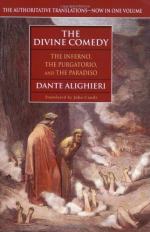“Cause too thou findst for doubt, in that it
seems,
That spirits to the stars, as Plato deem’d,
Return. These are the questions which thy will
Urge equally; and therefore I the first
Of that will treat which hath the more of gall.
Of seraphim he who is most ensky’d,
Moses and Samuel, and either John,
Choose which thou wilt, nor even Mary’s self,
Have not in any other heav’n their seats,
Than have those spirits which so late thou saw’st;
Nor more or fewer years exist; but all
Make the first circle beauteous, diversely
Partaking of sweet life, as more or less
Afflation of eternal bliss pervades them.
Here were they shown thee, not that fate assigns
This for their sphere, but for a sign to thee
Of that celestial furthest from the height.
Thus needs, that ye may apprehend, we speak:
Since from things sensible alone ye learn
That, which digested rightly after turns
To intellectual. For no other cause
The scripture, condescending graciously
To your perception, hands and feet to God
Attributes, nor so means: and holy church
Doth represent with human countenance
Gabriel, and Michael, and him who made
Tobias whole. Unlike what here thou seest,
The judgment of Timaeus, who affirms
Each soul restor’d to its particular star,
Believing it to have been taken thence,
When nature gave it to inform her mold:
Since to appearance his intention is
E’en what his words declare: or else to
shun
Derision, haply thus he hath disguis’d
His true opinion. If his meaning be,
That to the influencing of these orbs revert
The honour and the blame in human acts,
Perchance he doth not wholly miss the truth.
This principle, not understood aright,
Erewhile perverted well nigh all the world;
So that it fell to fabled names of Jove,
And Mercury, and Mars. That other doubt,
Which moves thee, is less harmful; for it brings
No peril of removing thee from me.
“That, to the eye of man, our justice seems
Unjust, is argument for faith, and not
For heretic declension. To the end
This truth may stand more clearly in your view,
I will content thee even to thy wish
“If violence be, when that which suffers, nought
Consents to that which forceth, not for this
These spirits stood exculpate. For the will,
That will not, still survives unquench’d, and
doth
As nature doth in fire, tho’ violence
Wrest it a thousand times; for, if it yield
Or more or less, so far it follows force.
And thus did these, whom they had power to seek
The hallow’d place again. In them, had
will
Been perfect, such as once upon the bars
Held Laurence firm, or wrought in Scaevola
To his own hand remorseless, to the path,
Whence they were drawn, their steps had hasten’d
back,
When liberty return’d: but in too few
Resolve so steadfast dwells. And by these words




